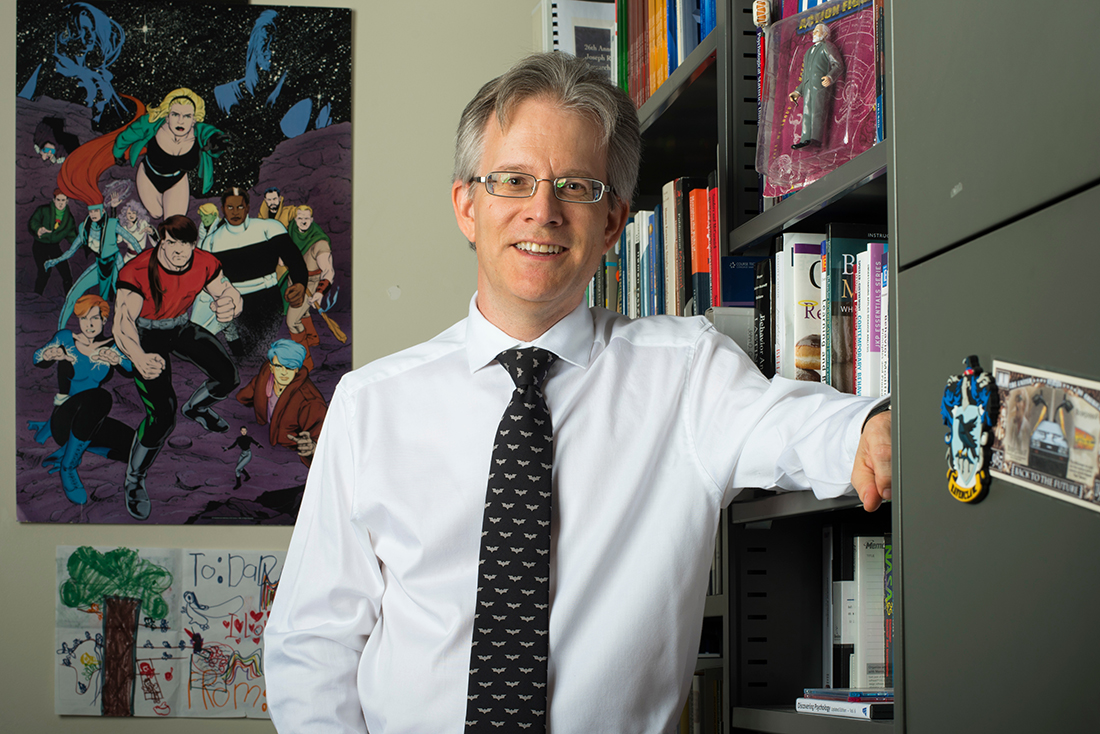
March 2017 Instructor of the Month Karsten Loepelmann explains how experimental psychologists apply the scientific method to studying the mind. Photo credit: John Ulan
What do you teach?
I teach a number of different courses, which typically include introductory psychology, behaviour modification, cognition, perception, advanced perception, and human factors & ergonomics. What ties these together is that they are all a part of experimental psychology: applying the scientific method to understanding mental processes and behaviour.
Why should people learn about this?
As an undergraduate, I first took a psychology course as an option, and loved it so much that I switched my specialization to psychology. In taking psychology courses, not only did I earn credits, but I learned a lot about myself. We all want to know more about ourselves; why we do what we do, and how we do it. Human beings don't come with an instruction manual, but an education in psychology is the next best thing.
What are some of its "real-world" applications?
I know that students are interested in the real-world applications beyond the theories, so I include many practical examples of psychology in everyday life in all of my courses. How can we best use our willpower to make the most appropriate behavioural choices? Can playing videogames prevent cognitive decline? How far should you sit from your big-screen HDTV? In particular, my PSYCO 494: Human Factors & Ergonomics course applies scientific knowledge about perception, cognition, and behaviour to the design and operation of human-machine systems. For example, I include topics on making aviation safer, increasing efficiency in the healthcare system, and even designing doors that are easier to open. There's a lot that psychology can contribute, in collaboration with industrial designers, engineers, and people in other applied industries--the applications are limitless.
What's the coolest thing about this subject area?
One of the things that attracted me to it is that psychology is an incredibly dynamic research field. There are many intense, ongoing debates in the scientific literature. I love presenting brand-new research that can serve as an important puzzle piece contributing to the big picture of our understanding. Sometimes, a study will shake things up, scattering the puzzle pieces around, and that's pretty exciting. And then there's the aspect that so many questions need answering, too.
You are a winner of the Kathleen W. Klawe Prize for Excellence in Teaching of Large Classes - what are some of the key considerations you take when teaching a big class?
Being a student in a large class can be a passive experience; research tells us that's not the best way to learn. Instead, I try to use active learning strategies. Fortunately, many psychological phenomena lend themselves well to classroom experiments and interactive demonstrations. In addition to using classroom response systems ("clickers"), in class I do memory experiments, auditory threshold tests, and visual search tasks, for example. Not only does active learning lead to better retention and outcomes, but it also increases student engagement.
You've received the ISSS award for Excellence in Teaching in 2013, 2015, and 2016. What is the key to connecting with your students?
To me, learning is a lot easier when I am engaged and having fun with the material. I don't take myself too seriously, and I like to have fun when I'm teaching. I don't teach because I have to--I want to! I love doing it, and I hope that comes through in class. (And in my office, too--come by and check out my Sigmund Freud action figure. Mint condition, in box.)
What was your favourite learning experience as an undergrad, and how do you incorporate that experience into teaching your students?
I took Prof. Walter Bischof's perception course here at the University of Alberta as an undergraduate. In the lab, we performed perceptual experiments on ourselves (even one on pain perception). It was so cool to have that hands-on experience. I try to find ways for students to have that same experiential learning by assigning computer-based labs, requiring students to modify one of their own behaviours, or making them find their way through an unfamiliar building to assess the physical design and layout.
What is one thing that people would be surprised to know about you?
I (unofficially) hold the world record for the Atari 2600 videogame Megamania. When you hit 999,999, the game ends. Sadly, I am not the first or only person to have done this.